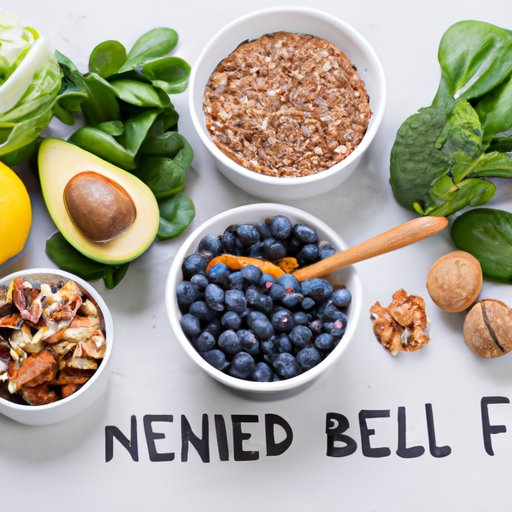Introduction
What does it mean to “eat like a genius”? In this context, it means eating a diet that is designed to nourish your brain and keep it functioning optimally. Eating a balanced diet is one of the best things you can do to protect your mental health, enhance your memory and cognitive performance, reduce your risk of neurological disorders, and overall feel your best.
The foundation of any healthy diet includes plenty of nutrient-rich foods, such as fruits, vegetables, lean proteins, and healthy fats. However, when it comes to eating for your brain, there are certain types of foods that are particularly beneficial. In this article, we’ll explore the science behind brain-boosting nutrition and provide tips on how to eat like a genius.
The Science of Nutrition
Your brain requires a wide range of vitamins, minerals, and other nutrients to function properly. According to a review published in Nutrients, some of the most important nutrients for brain health include omega-3 fatty acids, B vitamins, choline, iron, selenium, zinc, and magnesium.
In addition to providing your brain with the necessary nutrients, what you eat also affects your mood, energy levels, and cognitive performance. For example, research shows that eating a diet high in saturated fats and sugar can lead to impaired memory and decreased attention span.
On the other hand, consuming a diet rich in antioxidants from fruits and vegetables can help protect your brain from oxidative stress and inflammation. Studies have found that diets that are rich in antioxidants can reduce the risk of developing Alzheimer’s disease and other forms of dementia.
Healthy Foods to Eat
When it comes to eating for your brain, there are certain types of foods that can provide the necessary nutrients and protect your brain from damage. Here are some of the best brain-boosting foods to incorporate into your diet:
Omega-3 Fatty Acids
Omega-3 fatty acids are essential fatty acids that play an important role in brain health. Studies show that people who consume higher amounts of omega-3 fatty acids have better memory and a reduced risk of developing Alzheimer’s disease. Good sources of omega-3 fatty acids include fatty fish, such as salmon, mackerel, herring, and sardines, as well as walnuts, flaxseeds, and chia seeds.
Dark Green Leafy Vegetables
Dark green leafy vegetables, such as spinach, kale, and collard greens, are rich in vitamins, minerals, and antioxidants. Studies show that consuming these types of vegetables may help protect your brain from age-related decline and reduce the risk of developing Alzheimer’s disease.
Blueberries
Blueberries are packed with antioxidants, which can help protect your brain from damage caused by free radicals. Studies have found that consuming blueberries can improve memory, learning, and motor coordination. Other antioxidant-rich fruits include cherries, blackberries, cranberries, and raspberries.
Whole Grains, Legumes, and Nuts
Whole grains, legumes, and nuts are all excellent sources of fiber, B vitamins, and other essential nutrients that can benefit your brain. Research shows that consuming these types of foods may help protect against age-related cognitive decline. Good sources include oats, quinoa, beans, lentils, almonds, cashews, and walnuts.
Hydration
Drinking plenty of water is important for overall health, including your brain. Dehydration can lead to fatigue, headaches, and difficulty concentrating. The Institute of Medicine recommends that adults drink at least eight 8-ounce glasses of water per day.
Foods to Avoid
In addition to eating plenty of nutritious foods, it’s also important to limit or avoid certain types of foods that can be detrimental to your brain health. Processed foods, such as chips, cookies, and fast food, are high in unhealthy fats and added sugars, and can increase your risk of developing neurological disorders. Additionally, added sugars can lead to increased inflammation and impaired memory.
Conclusion
Eating like a genius means fueling your body with the right foods to nourish your brain and keep it functioning optimally. This includes eating plenty of omega-3 fatty acids, dark green leafy vegetables, blueberries, whole grains, legumes, and nuts, and limiting or avoiding processed foods and added sugars. By following these guidelines, you can protect your brain from damage and enjoy the benefits of optimal brain health.
(Note: Is this article not meeting your expectations? Do you have knowledge or insights to share? Unlock new opportunities and expand your reach by joining our authors team. Click Registration to join us and share your expertise with our readers.)
